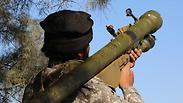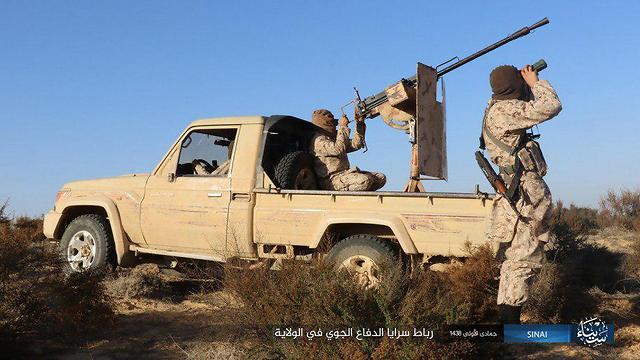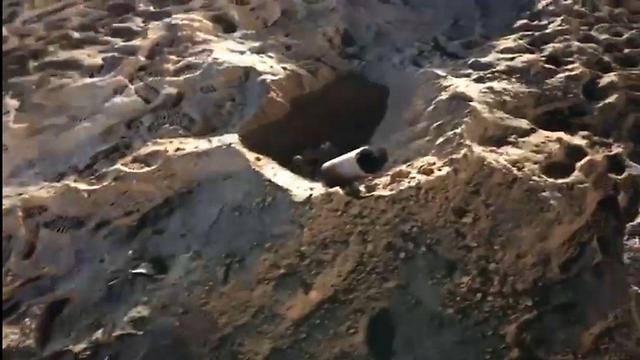

Land of terror: ISIS alive and kicking in Sinai
Analysis: After losing one stronghold after another in Syria and Iraq, the Islamic State organization has found a place where it can occasionally score achievements and get Hamas in trouble with Israel. Meanwhile, as it ponders whether to respond to ISIS’s strategic rocket fire, Israel is turning a blind eye to the massive amounts of weapons and forces the Egyptian army is bringing into the peninsula.
These two operations, which the organization claimed responsibility for, had two purposes: One, to demonstrate that despite being beaten in its strongholds in Syria and Iraq and being driven away from them, ISIS is still alive and kicking; and two, to disrupt Hamas’ reconciliation agreement with Fatah and its tightening relations with Egypt.
Both the reconciliation agreement between the two Palestinian organizations, and mainly the cooperation agreement with Egypt, contradict ISIS’s interests. The rocket fire into Israel, in the Gaza vicinity, is therefore aimed at raising the tensions and perhaps leading to an escalation and an active military conflict between the Gazan terror organization and Israel.

Another purpose of the ISIS operation is to attract activists who are fleeing Syria and Iraq and looking for a new area of activity on behalf of ISIS and its Salafi ideology.
ISIS has been forced to painfully give up a key part of its religious ideology, which separates the organization from al-Qaeda and other Salafi groups—the caliphate idea. It has lost the territory it took over in Syria and Iraq, which it declared the area under “caliphate” sovereignty and under the control of the “caliph,” Abu Bakr al-Baghdadi. In Iraq, the area was conquered by government forces with heavy backing from the Americans, the Kurds and Shiite militias sent by Iran. In Syria, the area was mainly conquered by a Kurdish Arab militia which receives American aid and backing.
The caliphate idea was one of the things that allowed ISIS to gain a lot of capital as a result of enslaving the local population, selling oil from the wells it took over, demanding ransom for hostages and imposing taxes on the population. All this is now slipping from its fingers and threatening to disappear. ISIS is losing one stronghold after another in the area defined as a caliphate, and these places are also being occupied by the Syrian army with Russian and Iranian backing.
Alternative channels
The IDF’s Intelligence Directorate estimated a long time ago that in such a situation, ISIS would seek two alternative channels. This first channel is mass attacks in Western Europe, North America and Africa, which are carried out not only by ISIS people who have returned from or fled Syria and Iraq, but also by locals inspired by ISIS’s social media activity. These “inspiration attacks,” as they are called in the West, allow ISIS to keep gaining prestige and supporters despite the blows it is suffering in the Middle East.
The second channel is decentralizing ISIS’s activity outside Syria and Iraq. The attempt to turn Libya into an ISIS center failed, and the organization members are now mainly left with Sinai and Boko Haram’s area of activity in Africa.
The Sinai Peninsula, despite being a limited area in which the Egyptian government is constantly fighting the Islamist organization, is still an attractive place where ISIS occasionally scores achievements. The organization also threatens the Suez Canal and the ships that cross it and is capable of expanding its activity from there into Egypt.

A number of Bedouin tribe leaders in Sinai, mainly in the south and center of the peninsula, recently protested ISIS’s activity following promises they received from the Egyptian government and because ISIS is disentangling the traditional-family-tribal fabric that has characterized the Bedouin tribes in Sinai until now. The tribe leaders managed to restrict ISIS’s activity in southern and central Sinai, but the organization is still active in northern Sinai and is executing suicide bombings and successful attacks on the Egyptian army and police. These attacks are not only murderous but also sophisticated, and because they are carried out in several places simultaneously, they almost always claim a heavy price from the Egyptian security forces.
Egypt is operating its air force and armored forces in Sinai unlimitedly, while Israel is turning a blind eye to the massive amounts of forces and weapons Egypt is bringing into Sinai in contradiction of the security appendix of the peace agreement between the two countries. Recently, Egypt also succeed in reaching an agreement with Hamas, disconnecting ISIS from its ideological logistic backing and from the route it used to have for evacuating injured activists into the Gaza Strip.
Under its new leader in the strip, Yahya Sinwar, Hamas prefers to ease the Gazans’ distress and reach an agreement with Egypt and a reconciliation agreement with Palestinian President Mahmoud Abbas rather than continue the alliance and the aid provided to the organization. That is the reason he has stepped up the security measures in the Philadelphi Route and is preventing ISIS people from moving in and out of the strip. He is also arresting activists of ISIS-affiliated Salafi organizations within the strip quite intensively.
As a result, ISIS feels the need to act against the enemies of its Sinai branch—Egypt, which is fighting the organization with certain yet insufficient success, and Hamas, which is currently cooperating with Egypt in a bid to ease the lives of the strip’s residents.
Sunday night’s operation did bring ISIS the return it had hoped for, at least in the short run. The Rafah Crossing, which had been closed for four months, was not opened Monday morning, and the strip’s residents were unable to leave for Egypt or return to Gaza. The second achievement is the rocket fire against Israel, which boosts ISIS’s prestige in the Muslim world and strengthens its image as an organization that fights not only Muslims but also Jews and the other heretics.
Israel is facing a dilemma. The practice is that in any event of fire or an infiltration into Israel, whether from Syria or from the Gaza Strip, the ruler in that area is declared responsible and the IDF acts against it. The “spillover” fire from Syria, for example, leads to limited attacks on Syrian army posts, and the rocket fire from Gaza—although it is not Hamas’ doing—leads to limited attacks on Hamas posts.
In Sinai, it’s a different story. The peninsula is a sovereign Egyptian area, and the Egyptians—especially President Abdel Fattah al-Sisi and his people—fear for their country’s national dignity and won’t tolerate Israeli military activity on their territory, even against ISIS.
Aware of the Egyptians’ sensitivity, Israel usually avoids attacking targets in the Sinai Peninsula, as long as there is no concrete and imminent danger to Israeli lives, like in 2012 when it thwarted a terror attack in the Kerem Shalom area. In such an event, Israel acts without seeking permission, but keeps a low profile so as not to irritate the Egyptians. Sources within ISIS and the foreign press claim Israel secretly attacks ISIS commanders and centers in Sinai when it gets an intelligence-related chance to do so.
Sunday night’s rocket fire, which was a strategic move on ISIS’s part, doesn’t fall into any of the categories in which Israel allows itself—despite the good relations it seeks to maintain with Egypt—to engage in military activity inside Sinai. When the fire comes from Sinai, Israel exercises restraint and lets the Egyptians act, especially as the Egyptian army is highly sensitive these days following the loses its suffered in Monday morning’s attack in Sheikh Zuweid.
What happened Sunday night possibly marks the beginning of a relocation of ISIS’s main military activity from Syria and Iraq to Sinai. The Israeli defense establishment is already preparing for this possibility.















